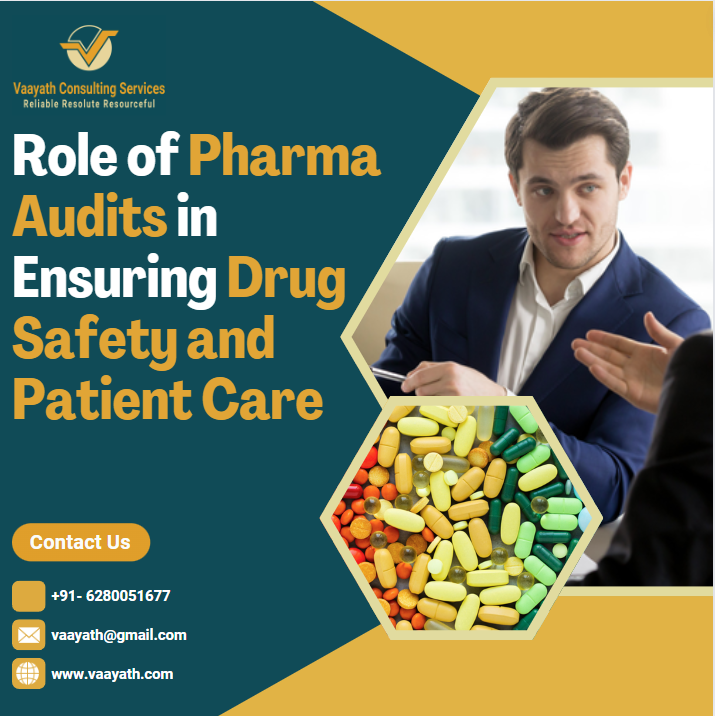Role of Pharma Audits in Regulatory Compliance for Pharmaceutical Companies
- Vaayathconsulting

- Sep 26, 2024
- 3 min read
Updated: Sep 27, 2024
Pharma companies need to follow the regulatory part very strictly to avoid any havoc that their drugs may create. Among the most major compliance parameters, there is the execution of regular Pharma Audits. These audits help a company meet the stringent demand of an audit by the regulatory bodies including the WHO, the FDA, or the EMA. Such audits are undertaken by the Food and Drug Administration (FDA), among others in the respective countries. Audits are important because they form the basis of good quality standards in the manufacture, storage, and supply of the pharmaceutical product.

Maintaining Quality Standards through Compliance with WHO GMP Audits
Audits by the WHO GMP are required for pharmaceutical companies if they are to meet the requirements of the world. WHO GMP represents that products, including drugs, are manufactured and controlled in a manner such that relevant quality is maintained. It evaluates various issues, such as tools, materials, and production practices, for ensuring that a company meets local and international quality standards.
Pharma companies need to have WHO GMP audits periodically to check whether their processes align with the expectations of regulations. Non-compliance with GMP standards is likely to result in penalty, withdrawal of the product, and even cancellation of a license at times. WHO GMP Audits provide companies the chance to improve their processes as well as raise operational efficiency.
Importance of Pharma Audits
Pharma audits are not only essential for maintaining regulatory compliance but also for good will of consumers, healthcare professionals, and also for regulatory authorities. In such an audit, there is checking of methods of productions, quality control documentation practices, among others in the company's operations.
The regular pharma audits also pinpoint potential risks in the production process. Any problem identified will therefore be fixed before it has a chance to affect the quality of the product. Audits give companies opportunities to evaluate their processes and improve their internal operations, thus creating a living situation in compliance with international regulations.
In addition, third party audits have been in recent lights since an audit of the third party is free from bias and provides an objective evaluation of the compliance level of a company. Pharma Auditing Consultants are usually independent so that they can easily give a fresh perspective, which helps companies ascertain areas that require improvement.
The Role of Third Party Audit Pharma Service
Typically, pharmaceutical companies outsource Third Party Audit Pharma Service for independent assessments. Independent Pharma auditing consultants scrutinize the company's processes and infrastructures and provide unbiased reports on compliance gaps. Third party audit service usually aids pharmaceutical firms to see how their systems are operated objectively by a review that illuminates areas that require improvement.
Third party audits are also very beneficial when pharmaceutical companies partner with other companies, like contract manufacturing or suppliers. They ensure that all parties involved in the supply chain maintain proper regulatory standards and that the integrity of the product is never compromised from time of production down to its distribution.
Importance of a Pharma Auditing Consultant
It should be a norm activity for a company to be advised by a Pharma Auditing Consultant on the complicated scenario of regulatory compliance. The consultants in pharmacy regulations can further offer specific services like gap analysis, process improvement recommendations, and compliance training services. WHO GMP audits and regulatory requirements are what the consultants have deeper knowledge about and assist companies in preparation for audits and continuous compliance.
They assist the drug companies design audit-ready systems so that such companies will have the correct procedures in place to ensure control over very important factors used in the drug production processes which meet regulatory requirements. They provide hand support to the companies during the audit process so as to assist the companies in responding genuinely to Pharma Auditing Consultant questions and rectify the situations if compliance requirements identified.
Conclusion
Pharma Audits have to be the most essential activities of pharmaceutical companies, if only for being deemed compliant with regulatory requirements and for sustaining the highest standards of product quality. WHO GMP Audits Third Party Audit Pharma Services, coupled with consultancy advice from Pharma Auditing Consultants, ensures that companies can regularly review and update themselves for any operation that might come into existence. Not only is auditing a legal requirement but also an essential practice in protecting public health, enhancing operational efficiency, and having long-term trust with consumers and the regulatory bodies.
For more information on pharmaceutical auditing services, check out https://www.vaayath.com a trusted regulatory compliance and quality assurance partner for pharma companies.
